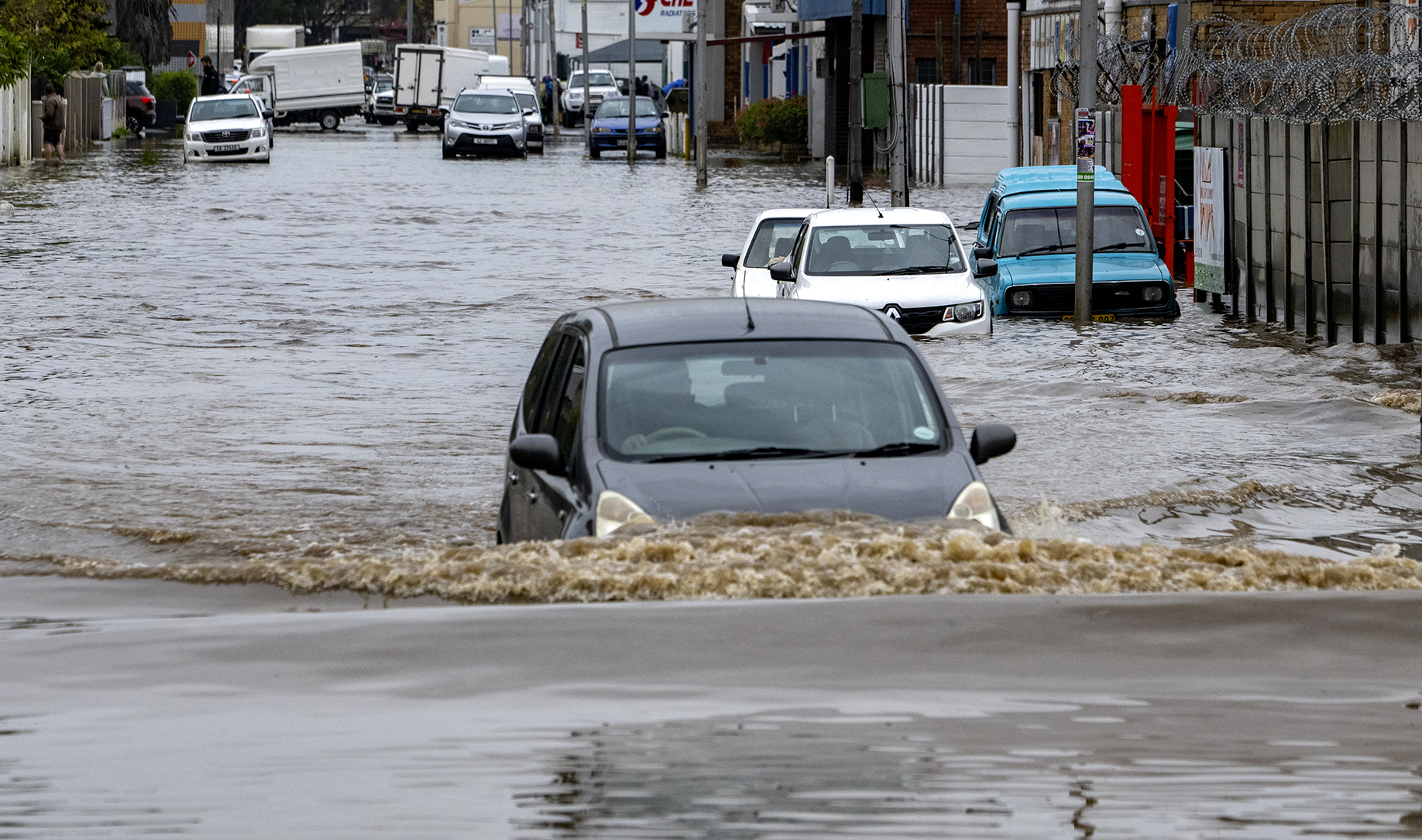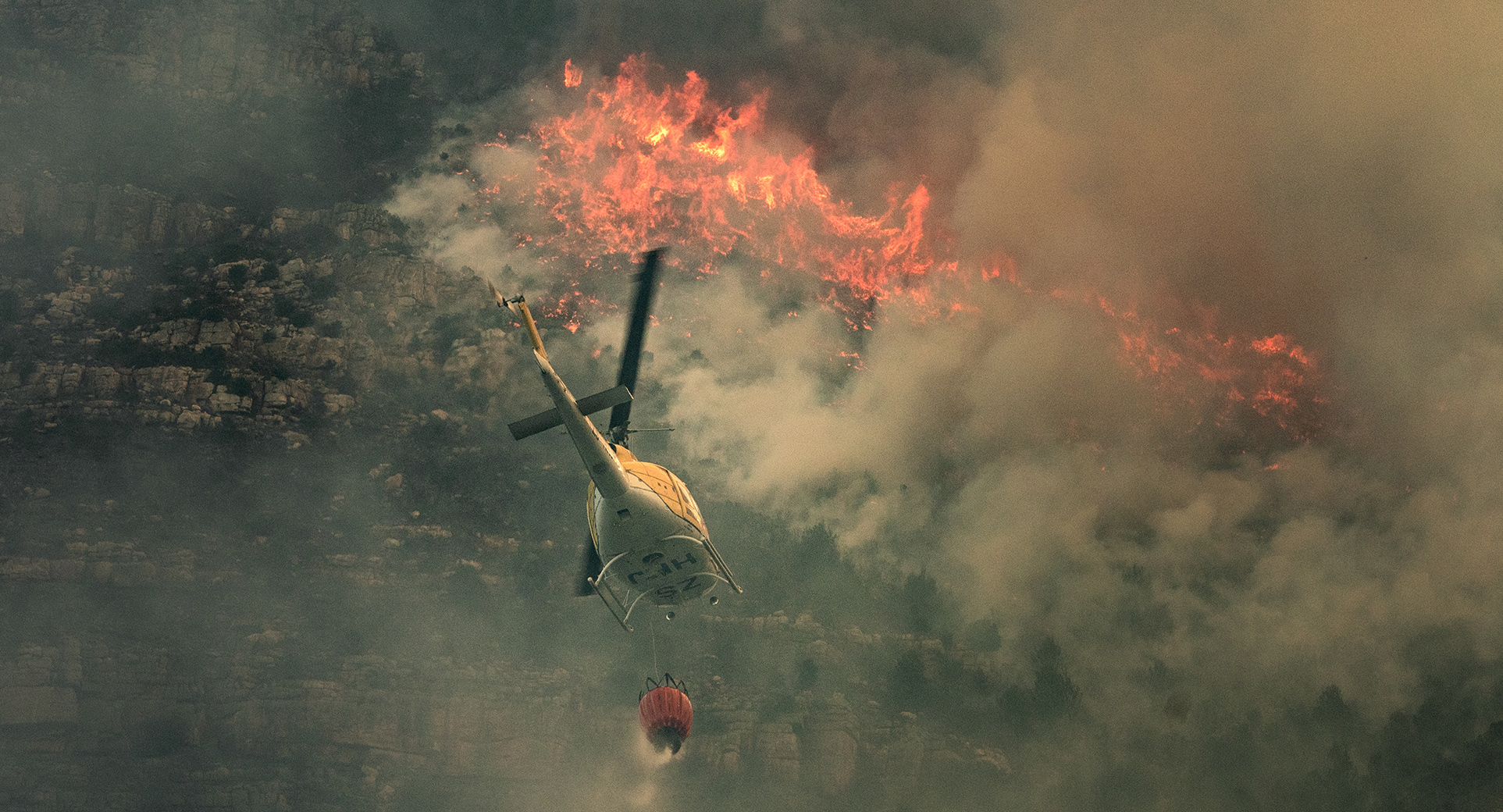CLIMATE CRISIS
Western Cape puts climate on cabinet agenda after months of environmental disasters

After a year in which the province experienced floods, a storm surge and devastating wildfires, climate change will be added as a permanent item to the Western Cape administration’s agenda. This should ensure there are sufficient resources to respond to climate-related threats.
Climate change has been added as a permanent item on the Western Cape government’s agenda in what is seen as a win for streamlining climate governance. The move was adopted on 6 March and comes after the province was battered by months of climate-related disasters.
Although the Western Cape is expected to become drier, hotter and have more severe storms and droughts, the province has already faced several climate-related issues in the past year.
Anton Bredell, MEC for Local Government, Environmental Affairs and Development Planning, with Ivan Meyer, MEC for Agriculture, announced that climate change would be added as a permanent item on the provincial cabinet agenda as they signed a climate change pledge of the Western Cape government.
The move was hailed during the inaugural Western Cape Climate Change Indaba in Cape Town on 9 March.
During the event, officials sought to ensure that a “whole-of-society” approach was established to tackle climate change in the province, instead of simply leaving it up to the Department of Environmental Affairs and Development Planning (DEA & DP) and the Department of Agriculture.
Bredell told Daily Maverick that the addition to the cabinet agenda was approved on 6 March, but has been in the works for some time.

Flooded homes on 25 September 2023 in Sandvlei, Cape Town. Disaster management officials worked through the night dealing with flooded roads, damaged homes, uprooted trees and power outages. (Photo: Benton Geach / Gallo Images)
He said things didn’t simply appear on the cabinet agenda, but that they had worked to put climate change into the middle of their governance working streams.
“This is because climate change is one of the topics cutting into all departments, and for too long it seemed like it was the [sole] responsibility of the DEA and DP and the Department of Agriculture.
“But it’s cross-cutting… it is how you design a building, where you’re going to plan your next housing development, the importance of managing our estuaries and so on…
“It was very important to land it in the cabinet, and we’ve done that,” he said.
Other officials within the Western Cape government said there has been an increase in the frequency and severity of climate extremes, particularly heat waves and floods caused by erratic rainfall.
DEA & DP head Gerhard Gerber said, “The devastating impacts of these events are not only evident in our physical environment but also profoundly affect our communities, economies and the very fabric of our society.
“Unprecedented floods such as those that occurred in June and September last year continue to erode the numerous developmental gains that the Western Cape has achieved.”
Although the Western Cape government plays a role in all sectors, Gerber said its constitutional mandate limits decision-making and implementation ability, particularly in terms of resource choices such as the energy mix and management of water resources.
Adding climate change as an item on the cabinet agenda was expected to assist in ensuring sufficient money and resources were allocated to respond to increasing climate-related threats across the province.
Increase in severity of climate extremes
The Western Cape is the most disaster-prone province in South Africa, according to Bredell, and is particularly vulnerable to climate change and the effects of climate-related hazards because of its coastal location, with rising sea temperatures expected to influence regional weather patterns.
“The Western Cape is characterised by a highly variable weather and climate regime. This means that we experience all manner of extreme weather and climatic events including flooding, drought and extreme temperature,” Bredell said.
At least R3.5-billion worth of infrastructure was destroyed in two major flooding events during June and September last year.

Motorists drive through a flooded Textile Street after heavy rain on 14 June 2023 in Paarl, Western Cape. (Photo: Gallo Images / Die Burger/Jaco Marais)
In June 2023, the beginning of the province’s rainy season, the intense and prolonged rainfall resulted in disastrous flooding that left people homeless, infrastructure washed away, uprooted trees, damage to farmlands and agriculture and deaths by drowning.
Daily Maverick previously reported that two people died and many were displaced due to excessive rainfall in the Western Cape between 14 and 19 June 2023.
Following successive cold fronts and exceptionally rainy weather that battered parts of the Western Cape over June, scientists told Daily Maverick that the total rainfall by 21 June last year was the highest experienced in the region since 1976.
Further flood damage was experienced in September 2023 when a storm over the Heritage Day weekend caused flooding and mudslides, affecting homes, blocking off whole communities, destroying bridges and altering river courses.
That month, a national disaster was declared for the Western and Eastern Cape to unlock funding and repair the damage left in the wake of the floods.
In addition, the province also experienced a storm surge along the coastline which wreaked havoc between 16 and 17 September 2023. This resulted in flooding of low-lying areas, people being swept off beaches, coastal inundation, estuary flooding, damage to infrastructure and disruption to coastal activities.
Daily Maverick previously reported that in Wilderness, Western Cape, a 93-year-old woman died after being swept off her feet by a wave while standing in a parking lot.
Then there’s the intense wildfire season in the Western Cape which began in December and is expected to come to an end in April.

Helicopters drop water on a fire near Millers Point, Simon’s Town, on 20 December 2023. (Photo: Gallo Images / Brenton Geach)
A Daily Maverick report revealed the staggering scale of Western Cape wildfires during the season, with more than 6,000 fires destroying around 100,000 hectares of land. Entire communities were evacuated during December 2023 and January 2024.
The wildfires have pushed firefighters and firefighting resources to their limits with fire after fire endangering homes, animals, people and the environment.
Read more here: StoryMapJS: tracking the western cape wildfires
Bredell told Daily Maverick, “There used to be floods every 10 years but now every year there are a couple of floods and fires. We had a very bad winter season with the June floods… June and September were very difficult.”
Bredell said that on the Monday morning following the Heritage Day weekend storm, 154 roads were closed, the Overstrand was without water because infrastructure had been washed away, and 82,000 people were left without electricity.
By the end of that week, 68 roads were still closed and 1,000 people were without electricity. The water supply, however, had been restored to Overstrand.
Bredell said many lessons were learnt that week.
“We need to think differently about redesign. There are many areas that we will need to rethink. Not just rebuild them, but rebuild with climate change at the back of our minds. Otherwise, we’re going to reinvest every year there’s a flood or another climate threat,” he said.
Read more in Daily Maverick: Western Cape hospitality and tourism industry still counting the ‘massive’ cost of mudslides and flooding
When the cabinet discusses budgets, Bredell said that everybody needed to understand that sufficient funds had to be made available for climate change in the future.
“Otherwise, we are in trouble.”
Agriculture MEC Ivan Meyer added that South Africa’s agricultural sector was also facing devastating impacts of climate change, with farmworkers’ lives being lost due to extreme weather patterns.
“I see what is happening with climate change around the world and in South Africa. I was deeply touched when I saw on the news that six farm workers near Kakamas in the Northern Cape had died as a result of the extreme heat [in January 2023],” he said.
Meyer said all these instances spurred them to approach the premier and request that climate change be added as a permanent item on the provincial cabinet agenda.
Policy and legal context
Karen Shippey, chief director of environmental sustainability in the DEA & DP, said the Western Cape government’s climate change journey began in the 2000s when it had one of the first climate change strategies in South Africa as a regional government.
That was the Climate Change Response Strategy in 2008. The government completed a second update and revision in 2023, presenting a collective plan for how to address the long-term impacts of climate change and to reduce the Western Cape’s greenhouse gas emissions.
“That strategy was beautifully written. It says all the right things, but we struggled to implement them. One of the reasons we struggled is because the government is only part of the answer, and at the time, there wasn’t enough pressure and urgency around climate change.
“Therefore, we’ve gone through the mechanisms of trying to understand what it is we must do. What is it other sectors must do? Which sectors are going to be impacted? How will the Western Cape look in 2030, 2040, and beyond? It doesn’t look good,” she said.
When average temperatures increase at the rate they are now, Shippey said the province could start to see the kind of heat waves experienced in the Northern Cape – the kind that kills agricultural workers and leads to schools developing a heat protocol for children.
“These are the kinds of things that we are going to have to deal with now,” she said.
Prof Guy Midgley, head of Stellenbosch University’s School for Climate Studies, told Daily Maverick that an integrated approach was needed to address climate change issues.
“It’s an incredibly useful move to include climate change as a permanent issue because of its role in amplifying risks across all sectors. If you don’t account for climate change and continuously return to it, and it falls off the agenda, you lose that.
“The ability to integrate climate change [into the cabinet agenda] also helps you to integrate across sectors and to make sure that investments make sense and the right balance is made,” Midgley said. DM






















 Become an Insider
Become an Insider
Well done the DA yet again. Heaven forbid that they ever lose control of the Western Cape. Look at what’s already happened in Knysna in just 18 short months since the useless ANC – assisted by the crooked Mckenzie – took over!
Every single thing described is a weather event. Not in any way linked to climate change.
Climate change means an observed change frequency or intensity of weather events.
S single instance of 6 workers dying from heat exposure isn’t proof of climate change it’s proof of a single extreme event.
And extreme events are very well documented. The IPCC sets this out clearly. There is no observed change in frequency or intensity of any weather systems nor is there any attribution of weather events to human caused climate change.
Wild fire might have been more extensive this year. But fire is an existential requirement for fynbos. This doesn’t require a climate change response but rather a planning and mitigation strategy to allow for regular burning without affecting infrastructure.
Whilst a standard agenda item to deal with weather related risks is probably mandatory deeming it a climate change risk is disingenuous and will detract from proper mitigation.
One step forward, two steps back. Its a permanent item on the agenda but the budget for the Liveable Urban Waterway Programme, that speaks directly to this item, has been slashed. Talk is cheap.